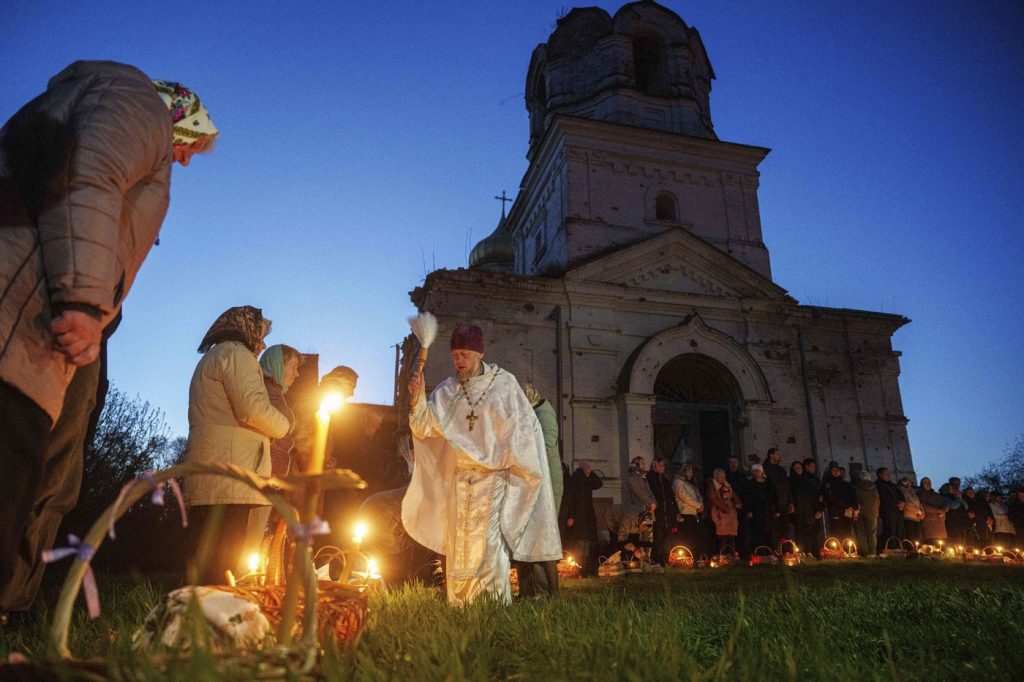LUKASHIVKA, Ukraine (AP) — On Easter Sunday, dozens of Ukrainians gathered outside the ruins of the Ascension Church in Lukashivka, a village in northern Ukraine, to commemorate the holiday amidst ongoing conflict. Many attendees expressed skepticism about the prospect of a ceasefire with Russia.
Russian President Vladimir Putin had declared a temporary Easter truce from Saturday evening until midnight on Easter Sunday, citing humanitarian reasons. This announcement came shortly after U.S. President Donald Trump described the negotiations between Ukraine and Russia as reaching a critical point. However, Kyiv has been doubtful about the sincerity of this truce, considering it unlikely to result in a genuine halt to hostilities.
Ukrainian President Volodymyr Zelenskyy reiterated Ukraine's offer for a 30-day, full, and unconditional ceasefire while urging Moscow to respond. Despite the ceasefire announcement, Zelenskyy noted that Russian strikes have continued, albeit with reduced intensity, especially near the border regions of Kursk and Belgorod, where Ukrainian forces are stationed. Soldiers at the frontline confirmed that fighting was ongoing.
The Easter service in Lukashivka was marked by both resilience and somber reflection. Parishioners gathered in front of the roofless silhouette of the damaged church, holding traditional Easter baskets and cakes for blessings. The priest, Serhii Zezul, called out, "Christ is risen!" as he shared holy water over the items, his voice competing with the sound of a nearby generator.
Despite the devastated state of the original 20th-century church, which could take hundreds of thousands of dollars to restore, the community held onto their faith. According to Ruslan Khalikov, who leads the "Religion on Fire" project, over 530 churches across Ukraine have suffered damage or destruction since the start of Russia's full-scale invasion in February 2022, resulting in the deaths of at least 25 clergy members.
One worshiper, 44-year-old Olha Rudeno, noted that the war has made her hesitant to attend large gatherings in urban areas that could be targeted. "Given the war, it’s psychologically difficult for me to go where there are large gatherings in cities," she said, expressing her disbelief in the possibility of a ceasefire and describing such hope as self-deception.
As prospects for a ceasefire dim, particularly following Moscow's rejection of a comprehensive proposal that requires concessions from Ukraine, skepticism remains high. Observers, including Zezul, share in this doubt about possible peace, indicating that regardless of any potential ceasefire, fighting continues on the front lines.
Despite these hardships, Easter celebrations were infused with hope. Zezul reflected on the community's resilience amid destruction, stating, "Despite everything, people still gather. They believe in something better." He emphasized the importance of faith during these trying times and the enduring spirit of those affected by the conflict.
In his Easter message, President Zelenskyy spoke of the struggles faced by many Ukrainians, expressing the challenge of maintaining faith in the face of doubt and suffering. He acknowledged the recent tragedies resulting from missile strikes across various cities, which have led people to turn inward during such incomprehensible times.
Addressing the perseverance of the human spirit, Zelenskyy declared, "Something invisible yet powerful within us doesn’t let us give up. It shows us where to find the light, so we don’t lose our way." This sentiment resonates deeply with the community gathered in Lukashivka, as they continue to uphold their traditions even amid ruins.










